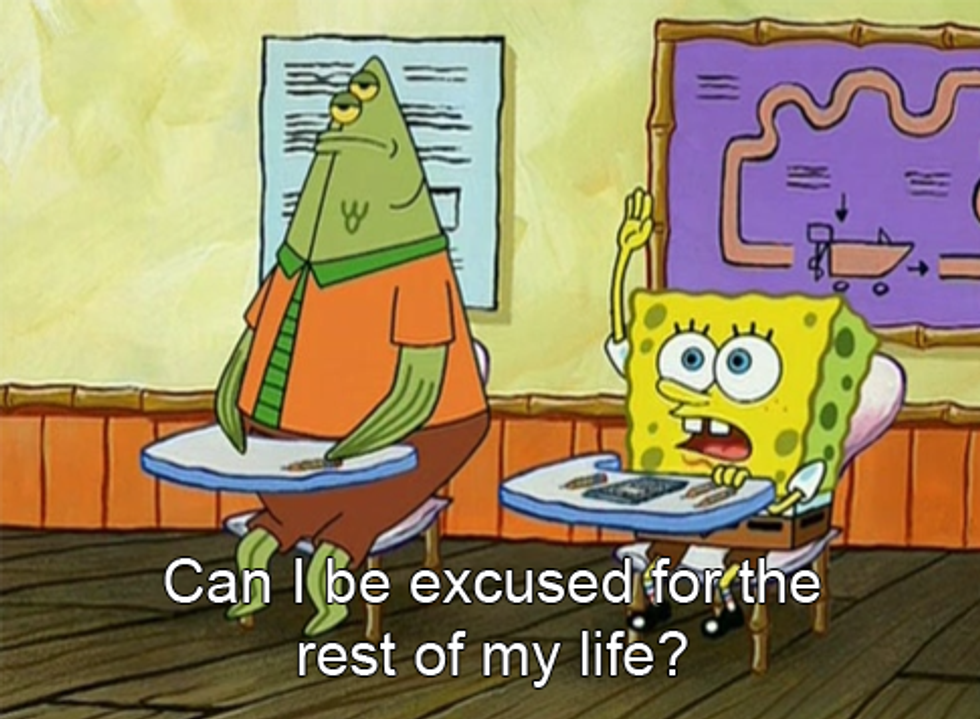There is something magical about a good story. I don't know what it is, but they move me. Maybe it's an ethereal thing? Maybe it's a scientific thing? Who knows.
More specifically, there’s something about a villain that makes my bones shake and my heart sink. And a really good one does the job of reminding me why evil is evil, and why good is good.
There’s something about a hero that breathes fire in my heart and remind me why I'm alive; they let me believe that good just may conquer evil, that justice just might be worth fighting for, and that anyone can do anything.
There's power in story.
Fictional or not, a good story and a good character can change a small thing, and they can change everything.
A good story can follow a character who’s found him or herself at the absolute lowest––beneath mountains of rejection and disappointment and pain, with neither subsistence nor courage––and it can watch that same character be reminded why they're alive and what they've got to live for. Then it can follow them as they rise from the very bottom to the very top.
As an audience, we get to watch the weak become strong and the strong become stronger. We get to watch men and women do the impossible, the impossibilities cower in fear and the naysayers run away with their tail between their legs.
We get to witness it all, and, ourselves, be inspired to go and do likewise.
That’s the power of story.
Of course, there is a sobering reality that follows each and every "The End." It comes as the shine of a new paperback gathers dust; it comes after the credits roll, as you re-enter the real world with the real people and the real problems and when you realize that out here, there is no anonymous crowd rooting for you. There is no studio audience laughing at your jokes. George Clooney and Russell Crowe are nowhere in sight, and as much as you may hope for it, Batman will not reply to your bat-signal. It’s just you, the shirt on your back, and the world before you.
So what now?
There is magic; but it always fades, right?
Parents and teachers love to encourage kids to “Reach for the stars,” but they really only mean “Reach for the next rung, but be very very careful.”
Yet, while that is frustrating, not all the blame can be put on other people. Sometimes it’s our fault. "They" may preach sermons of security, but it's you and I who choose to accept good story as mere fiction. It's our fault for deciding that mundanity is “reality” (whatever that is); it's you and I who are at fault for settling in beneath our mountain of rejection and disappointment and pain, with our very familiar lack of subsistence and courage.
Sometimes we choose to reject all the potential we have, and, instead, slip willingly into insignificance.
But I will give you this: It’s a very tempting cop out, and, were you to take it, you wouldn't be the first.
However, there is one problem with giving up, and there is one flaw in a lot of fairytale criticism.
- Giving up means accepting the lie that we can't, and ignoring the truth that:
- Fiction isn't as far from truth as you’d think.
All heroes say, anyway, is that you actually can.
No, there are no more castles and princesses and dragons and horses and men in green tights. (Thank God.) But you’re here, aren’t you? You’re here––you came into the world, you made a semi-triumphant entrance with a name and a face and a social security number; and, like many heroes, I’m willing to bet that you’ve faced a few minor dragons so far, and I can promise you that there will be a few more. And––here's the rub––you, yes you, have a choice to make, just like all the other characters in all the other stories.
Are you going to be a hero? Are you going to pick yourself up and face your foe with an unstoppable drive?
Or are you going to be one of the people in the stands, cheering other heroes on and wishing you had jumped in the ring yourself?
No, this is not an unfounded guilt trip.
Just pretend I’m in your corner, leaning on the floor of the ring, hanging on the ropes to get as close to you as I can so you can hear me cheering you on.
Here’s what I see: I see something that you don’t. You see the heavyweight champion of ____ opposite you, but I see a way to end your story with the announcer screaming “The winner is…” and raising your fist in the air.
Maybe you don’t see that. Maybe you imagine it ending with a lot of bruises and a lot of ice-packs. But, whichever way you feel about it doesn’t change the fact that you still have a choice.
You’ve just been hit in the jaw hard and you’re on the ground. You're breathing hard and you're ready to give up.
What's next?




















